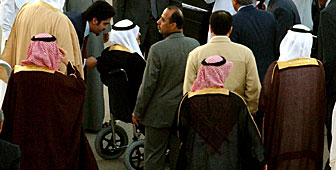Ailing King Fahd visits Switzerland

Saudi Arabia's King Fahd is making a rare visit to one of his favourite holiday destinations - Geneva.
The Saudi king has, in fact, not visited Geneva since he acceded to the throne 20 years ago, despite having a massive palatial complex built in one of the city’s most exclusive suburbs.
A Saudi source was quoted as saying that the king, who suffered a debilitating stroke in 1995, might undergo knee surgery during the visit if his health permits. The king, who also has arthritis and diabetes, was due to have a knee operation in Switzerland in 1996, but the visit was cancelled at the last minute.
The anonymous source said the visit did not mean the king’s health had taken a turn for the worse. That assessment is backed up by the fact that he was able to undertake such a journey.
Saudi insiders said the unexpected visit had nothing to do with fears of anti-Saudi upheavals in the kingdom, or with rumours of splits within the Saudi royal family over support for the US-led war on terrorism.
Big entourage
The Saudi mission in Geneva refused to give any details about the visit. Officially, the king’s holiday is for an indefinite period. It is understood he will spend a number of weeks in Geneva before travelling on to his holiday villa in Marbella, on Spain’s Costa del Sol.
The king and an entourage reportedly numbering around 350 people arrived at Geneva airport on Monday evening in six large aeroplanes, two of which will be based in Geneva for the duration of his stay.
Geneva police say they have taken no extra security precautions to protect King Fahd, saying he was a head of state like any other. They said they would provide an escort, if asked, should the king decide to venture outside his residence.
The Saudi press agency said the monarch had come to Geneva to rest. It added that he had issued a decree ordering Crown Prince Abdullah to direct the affairs of the kingdom until his return. Abdullah, his half-brother, has effectively been running the kingdom since the king suffered his stroke.
Palatial villa
The king will be staying at his immense property – the Dawn Villa – in the chic Geneva suburb of Collonge-Bellerive. It will be the first time he has stayed in the three-storey white marble villa, dubbed “Little Versailles” by locals, which lies in a at the 17,000 square metre estate.
Reports have suggested that the monarch considered this home from home too small and too lacking in security.
The main building is linked to a complex of villas, in which members of the court live, by a system of underground tunnels.
Work on this palace, which began in the 1970s, was frequently held up by legal challenges from environmentalist groups and local residents.
This is the king’s first foreign trip for three years. His last excursion, in 1999, took him to his villa in Marbella, where he spent time recovering from the removal of a blood clot from his left eye.
Favourite haunt
But his unexpected arrival in Geneva – once one of his favourite haunts – has provoked considerable excitement.
“We’ve been expecting him for the past 20 years, since he built his house. He was always a regular visitor before he became king,” says Herbert Schott, manager of Geneva’s Intercontinental Hotel, where around 80 of the king’s staff will be staying.
“He has a choice of seven or eight residences around Europe. I think his main reason for coming to Geneva was to finally see the house he had built,” he told swissinfo.
Geneva became a playground for the Arabian Peninsula’s ruling elite in the 1950s and 60s. In the wake of the oil crises of the 1970s, their increasingly wealthy subjects followed in their footsteps. Geneva became a place of pilgrimage for those wanting to experience the lifestyle their rulers enjoyed.
Even if other destinations – like the French Riviera and the Costa del Sol – now rival Geneva, the Swiss city retains a special attraction for Gulf royals. Not only is it a shopping and business capital, it is also politically neutral and safer and quieter than cities like London and Paris. Increasingly, they have also been coming to Switzerland for medical treatment.
Impact on tourism
But Herbert Schott says he does not believe King Fahd’s visit will provoke a new wave of tourism by ordinary Saudis.
“If there is an increase this year, it will be more to do with the fact that people from the Gulf do not want to go to the United States after September 11,” Schott says, pointing out that the number of Arab tourists coming to Geneva has remained more or less constant for the past 25 years.
“We have a regular clientele that is very attached to Geneva,” he adds.
However, he did suggest that there might be more Arab leaders coming to Geneva this summer, taking advantage of King Fahd’s presence to hold talks with him and his senior advisers.
Fahd acceded to the throne of the world’s richest oil-producing state in 1982, since when he has sought to forge closer ties with the West. With a fortune estimated at $30 billion, he is the third or fourth richest man on the planet.
Since the stroke seven years ago, the monarch has been largely confined to a wheelchair. Saudi television has shown him chairing cabinet meetings and meeting foreign dignitaries, but he has made no public statements for several years. That role is left to heir apparent, Crown Prince Abdullah.
by Roy Probert

In compliance with the JTI standards
More: SWI swissinfo.ch certified by the Journalism Trust Initiative
You can find an overview of ongoing debates with our journalists here. Please join us!
If you want to start a conversation about a topic raised in this article or want to report factual errors, email us at english@swissinfo.ch.